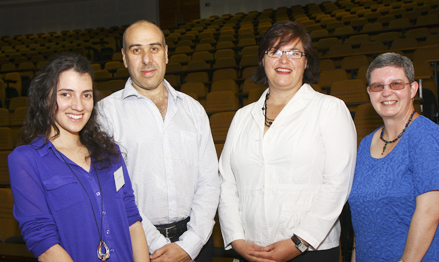Latest News Archive
Please select Category, Year, and then Month to display items
20 December 2020
|
Story Thabo Kessah
|
Photo Thabo Kessah
 Mbuyiselwa Moloi with student volunteers, Keamogetswe Mooketsi (presenter), Tshumelo Phaladi (producer), and Siphamandla Shabangu (SRC member – Social Justice and Universal Access).
Mbuyiselwa Moloi with student volunteers, Keamogetswe Mooketsi (presenter), Tshumelo Phaladi (producer), and Siphamandla Shabangu (SRC member – Social Justice and Universal Access).
The month of October 2020 marked the first anniversary of the Qwaqwa Campus online student radio, Q-Lit. “It has been a rocky road of sleepless nights, tears, and a lot of challenges. However, we have grown from strength to strength. We have made dreams of ordinary students possible. We have influenced change and inspired students to tap into their talents and potential,” said an elated station manager, Mbuyiselwa Moloi.
The station came in handy during the worst lockdown period of the COVID-19 pandemic when it bridged the communication gap between students and the university to integrate teaching and learning into the programming to ensure that no student was left behind. “With all of the regulations and online learning, Q-Lit had to be reinvented. While it was not an easy journey, we have grown more than ever before. Our August 2020 report shows that we have pulled in more than 1 600 listeners, even amid the learning, unlearning, and relearning processes. It was during this month that we also ran a series highlighting strategic offices led by women on campus as part of our Women’s Month celebration,” Mbuyiselwa revealed.
Looking to the future, the station hopes to obtain a full broadcasting licence from the regulatory body, the Independent Communication Authority of South Africa (ICASA), soon.
Workshop looks at new communities in the Free State and Gauteng
2013-11-08
 |
At the PARI workshop were, from the left: Laura Phillips, researcher at PARI, Prof Ivor Chipkin, CEO of PARI, Prof Corli Witthuhn, Vice-Rector: Research and Dr Tania Coetzee, Senior Lecturer in the Department of Political Studies and Governance.
Photo: Hannes Pieterse
08 November 2013 |
The university, in cooperation with the Public Affairs Research Institute (PARI), recently presented a workshop on new communities in the Free State and Gauteng. A variety of subjects, which explored the anthropology, sociology and history of the two provinces, were debated at the workshop. Discussions were held on the challenges faced by new communities, with the socio-economic and religious aspects of new communities coming under scrutiny. Environmental issues and responsibilities also came under fire and speakers agreed that individuals need to get involved in the community and that they should do something to address the housing and food shortage in South Africa.